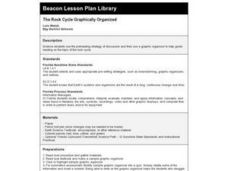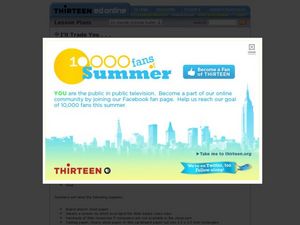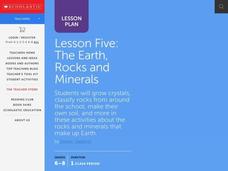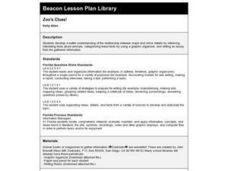Curated OER
It's All in the Making: Our Local Organizations
Students study African American nonprofit organizations. For this nonprofit organizations lesson, students discuss African American organizations. Students research the NAACP and NUL website. Students design posters for both groups....
Curated OER
Get To Know Your Local Philanthropic Organizations
Students develop appropriate interview questions, interview a philanthropic organization, and present information to the class. They use pamphlets and/or other materials gained during their interviews to mount a display about the local...
Curated OER
The Rock Cycle Graphically Organized
Fourth graders use the prereading strategy of discussion and then use a graphic organizer to help guide reading on the topic of the rock cycle. They use a worksheet imbedded in this plan to guide thier inquiry.
Curated OER
How to Make a Peanut Butter and Jelly Sandwich
Students complete a performance based assessment by writing and delivering their own "how to" speeches. They practice their speeches in pairs. They complete a flow chart demonstrating the steps for making a sandwich.
Curated OER
What Makes A Good Speaker?
Students write a response to a diagnostic assessment determining what they need to work on to become good public speakers. They listen to the Dr. Martin Luther King Jr. speech, I Have A Dream, and identify what makes a good speaker.
Curated OER
How Can Librarians Work To Eliminate Cultural Bias In The Organization Of Information?
Students explore the complexities of organizing information and to support librarians in developing strategies for reducing cultural bias. Students extend strategies to help raise solutions. Students list a variety of definitions on bias...
Curated OER
Organizers for Students
Students . In this organization lesson, students have a general discussion about sports cards and make a chart to answer the questions. Students read the baseball card story from USA Today. Students watch a web video about sports in New...
Curated OER
Making Use of Fieldwork
Students transcribe, analyze, and archive fieldwork and create a team project drawn from fieldwork. They brainstorm a list of reasons why preservation of collected materials is important and explore the online archives of the American...
Social Media Toolbox
About Facebook
If everyone is on Facebook, should the school's news publication be as well? Scholars study a social media giant in the 11th lesson from The Social Media Toolbox's 16-part series. The activity combines individual study and collaboration...
Scholastic
Lesson Five: The Earth, Rocks and Minerals
Apply the principles of geology to a series of collaborative, hands-on class activities. Young earth scientists learn more about igneous, metamorphic, and sedentary rocks before classifying and weathering rocks that they find....
Trinity University
Explain Yourself: An Expository Writing Unit for High School
Introduce expository writing with a unit that asks writers to craft an essay to explain a belief, value, or priority that is important to them. Mini-lessons within the unit focus on crafting thesis statements and conclusions, selecting...
Curriculum Corner
Guest Teacher Plans: Grade 6
Taking a day off of school can feel like a lot more work than going because of the time and effort that goes into making sub plans. Make your life easier with a daily plan for a guest teacher designed to meet the needs of sixth...
Missouri Department of Elementary
Goldilocks Revisited
After a read-aloud of the story Goldielocks and the Three Bears, scholars gather into small groups to answer a series of questions. Peers examine the idea of smart decisions and identify three feelings of characters alongside three...
Social Media Toolbox
Social Media Survey
Survey says ... social media is here to stay! How do the pupils in your school use social media? Using lesson four from a 16-part series, The Social Media Toolbox, learners study surveys and create their own. The resource includes...
Curated OER
Zoo's Clues!
Students determine the difference between major and minor details after researching animals and completing graphic organizers. They write descriptive paragraphs for classmates to guess what animal is being described.
Curated OER
Providing Service for a Nonprofit
Students participate in a non-profit organization. In this citizenship activity, students volunteer at a non-profit organization and apply the concept of philanthropy. Students reflect upon their experience.
Curated OER
Cell Structure and Function
In this cell worksheet, students chart the function of various cell structures. Students list the organization of a multicellular organism and illustrate plant and animal cells.
Curated OER
Composting
In this recognizing items that can be composted worksheet, students identify organic items that can be composted, write items that can be composted for each of the letters in the word compost, and make a list of vegetables and fruits....
Curated OER
Closer to the Ground
Students understand the idea of a nonprofit organization, the service donated by others, and how it helps a community. In this philanthropic activity, students explore the types of nonprofits that would be beneficial to a school and what...
Curated OER
Getting our Paws into the Cause
Twelfth graders examine local, state, and/or national animal welfare organization. For this Social Studies lesson, 12th graders research their identified organization. Students develop a planned intervention...
Curated OER
National Hanging Out Day
In this National Hanging Out Day worksheet, students complete activities including reading a passage, matching phrases, fill in the blanks, correct word choosing, multiple choice, sequencing, unscramble the sentences, write questions,...
Curated OER
Making Inferences about Problem and Solution
Students use unfamiliar objects to make inferences. In this making inferences lesson, students make guesses about what an item does. Students brainstorm together and make lists of ideas and write them on index cards. The teacher gives...
Curated OER
Healthy Foods
Students view a video which explores the following statement. "You are what you eat." They discuss the food industry, organic foods, and healthy food choices. They chart what they eat on a daily basis and make plans for healthier options.
Curated OER
What is Coral?
Students discuss what they know about coral reefs and are introduced to the importance of preserving coral reefs. In this coral reef lesson, students make connections between coral ecology in the classroom and in the real environment...























